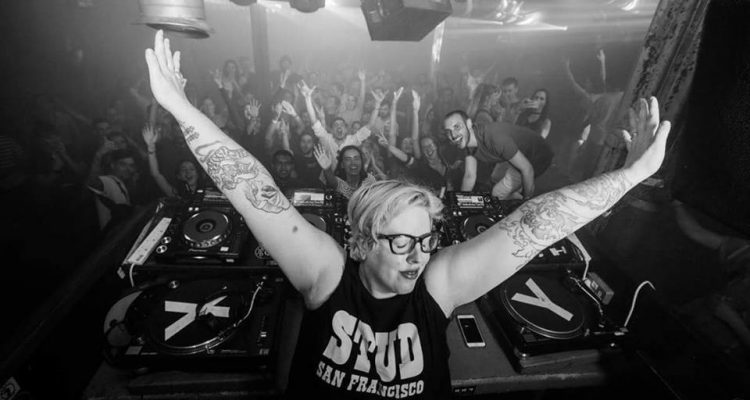By Daniel Katz
My heart opens at every dance show catered by the DJ, artist, and producer The Black Madonna (a stage name for Marea Stamper). Thursday September seventh was The Black Madonna’s third “Make it New” dance night performance, and her fourth appearance in Boston, Massachusetts. The line snaked out of the Middlesex Lounge in Cambridge, MA, where I waited for two hours with my friends to dance to my favorite DJ. We all need a break from the hate, but The Black Madonna dance floor is so much more; it’s a place to revel in love, community, and active mediation through a music selection that spans disco, house, techno and every bit of soul in between.
The story of The Black Madonna has recently taken on a mythic quality in the underground dance music scene. Marea became enamored with dance music at an illegal rave at 14, left home at 16 to sell mixtapes at dance shows across the Midwest, and moved to Chicago to study the masters of house music such as Derrick Carter and Frankie Knuckles. She got a start DJ’ing at her college radio station and soon was mixing for electronic dance music events with skills learned through her involvement in the early 90’s Midwest dance music scene. Underground dance music is based on selecting vinyl records on turntables to create mixes meant to enthrall dance floors in the communal bliss of movement and emotion. House and techno music were born in the clubs of Chicago and Detroit, before spreading throughout the world and gaining mainstream popularity in Europe. Dance music has traditionally been a refuge of expression for people of all ethnicities and cultures as well as gender and sexual identities. The Black Madonna’s shows emphasize a nightclub community bonded through a lineage of dance music that streams fluidly across all genres, with a focus on dance floor inclusion.
The Black Madonna has been trying to make her break in the dance music industry for over twenty years. She’s held a plethora of jobs trying to make it as an artist, including: merchandising, promoting, label managing, and distributing music. She only started to receive mainstream attention with her release of the track “We Don’t Need No Music (Thank You Rahaan)” and 2013’s “Lady of Sorrows” EP. She has continually released a stream of remixes amongst a brutal around-the-world touring schedule. In 2016 she released her single “He Is the Voice I Hear” to critical acclaim and there are rumors that a full album is coming soon. The single “He is a Voice I Hear” is a mellifluous disco track with a taunting piano intro, driving string lines, and a bass beat that syncs perfectly with classic disco emotion.
DJ’s often are not accepted as artists until they produce their own tracks, but since Marea doesn’t fit the Barbie-doll aesthetic, her path to recognition was all the harder. The dance music industry is not immune to attitudes of sexism, homophobia, transphobia, and body negativity that keep many artists in the shadows. In her late thirties, Marea Stamper was named Mixmag DJ of the Year in 2016 and is taking her mainstream limelight to speak up for women and LGBTQ artists. She speaks out for equal representation on festival lineups that are dominated by men and is pushing for safety on dancefloors where sexual harassment is all too common.
The opener last Thursday night was the Punisher, a female Detroit-based DJ representing the driving, thumping brand of techno that the city is known for. The Black Madonna finished Thursday night with an eclectic mix and contagious enthusiasm that had everybody pumping smiles. She mixed acid house with 90’s rap, revved a Loleatta Holloway disco track, and her synth lines twinkled in the night. Black Madonna shows have perfect emotional timing, so when the audience is about to burst she knows how to bring it down. She knows how to emote the tension and heartbreak that is needed, then speeds into a winding techno beat allowing cathartic release. One of my favorite moments of the night was when she mixed “Fix It Man (Build a House Mix)” by Ragtyme that has a 90’s rap line over a wonky synthesizer backbone. It’s obvious through her DJing that The Black Madonna is a DJ that has lived and breathed the depths of dance music and practiced the craft of selecting music on the turntables for over twenty years. She brings a creative energy that allows a community of dance-music nerds to lose their minds and hearts to music.
This was my sixth Black Madonna show. Even though she started playing at 10:30pm and I only made it into the club from 12:45-2am, it was everything I needed. I blew her a kiss and let her know I loved her at the end of the show. Check out the WHUS DJ training dates for your opportunity at radio and multimedia expression.


